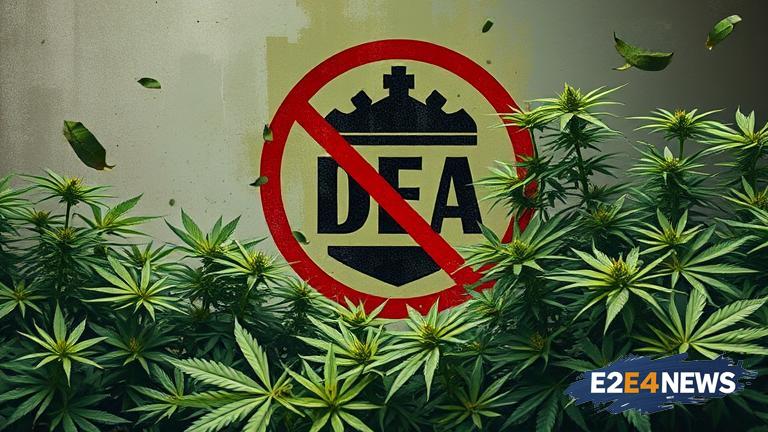The Drug Enforcement Administration (DEA) has been criticized for its stance on cannabis, with many arguing that its refusal to reschedule the substance is allowing black markets to flourish. Despite growing evidence of the medicinal benefits of cannabis, the DEA has maintained its classification of the substance as a Schedule I controlled substance. This classification has hindered the growth of the legitimate cannabis industry, as it limits access to banking and other financial services. As a result, many cannabis businesses are forced to operate in cash, making them vulnerable to theft and other crimes. The lack of regulation has also led to a proliferation of black markets, where cannabis is sold without any quality control or taxation. Experts warn that the DEA’s stonewalling tactics are not only allowing black markets to thrive but also undermining the efforts of law enforcement to combat organized crime. The cannabis industry has grown significantly in recent years, with many states legalizing the substance for medicinal and recreational use. However, the DEA’s refusal to reschedule cannabis has created a confusing and often contradictory regulatory landscape. While some states have implemented strict regulations on the cultivation and sale of cannabis, others have taken a more laissez-faire approach. This has led to a situation where cannabis is being sold in some states without any quality control or taxation, while in other states, it is heavily regulated. The DEA’s stance on cannabis has also had significant implications for research into the substance. Many scientists have argued that the DEA’s classification of cannabis as a Schedule I controlled substance has limited their ability to conduct research into its medicinal benefits. As a result, there is a lack of evidence on the effectiveness of cannabis in treating a range of conditions, from chronic pain to epilepsy. Despite this, many patients have reported significant benefits from using cannabis, and there is growing evidence that it may be an effective treatment for a range of conditions. The DEA’s refusal to reschedule cannabis has also had significant implications for the economy. The cannabis industry is estimated to be worth billions of dollars, and it has created thousands of jobs in states where it has been legalized. However, the lack of regulation has limited the growth of the industry, and many businesses are struggling to access the financial services they need to operate. The DEA’s stance on cannabis has also had significant implications for social justice. Many argue that the war on drugs has disproportionately affected minority communities, and that the DEA’s refusal to reschedule cannabis is perpetuating this inequality. As the debate over cannabis continues, it is clear that the DEA’s stance on the substance is having significant implications for the industry, the economy, and social justice. The DEA’s refusal to reschedule cannabis is allowing black markets to thrive, hindering the growth of the legitimate cannabis industry, and limiting access to medicinal cannabis for patients who need it. It is time for the DEA to reconsider its stance on cannabis and to work towards creating a more regulated and equitable industry. The cannabis industry is not going away, and it is time for the DEA to acknowledge this and to work towards creating a more sustainable and equitable future for the industry. The DEA’s stonewalling tactics are not only allowing black markets to thrive but also undermining the efforts of law enforcement to combat organized crime. The DEA’s refusal to reschedule cannabis is also limiting access to medicinal cannabis for patients who need it, and it is time for the agency to reconsider its stance on the substance. The cannabis industry has the potential to create thousands of jobs and to generate billions of dollars in revenue, but the DEA’s refusal to reschedule cannabis is limiting its growth. It is time for the DEA to work towards creating a more regulated and equitable industry, and to acknowledge the medicinal benefits of cannabis. The DEA’s stance on cannabis is not only hindering the growth of the industry but also perpetuating inequality and limiting access to medicinal cannabis for patients who need it. The DEA’s refusal to reschedule cannabis is a significant obstacle to the growth of the industry, and it is time for the agency to reconsider its stance on the substance. The cannabis industry is a significant contributor to the economy, and it has the potential to create thousands of jobs and to generate billions of dollars in revenue. However, the DEA’s refusal to reschedule cannabis is limiting its growth, and it is time for the agency to work towards creating a more regulated and equitable industry. The DEA’s stance on cannabis is not only allowing black markets to thrive but also undermining the efforts of law enforcement to combat organized crime. The DEA’s refusal to reschedule cannabis is also limiting access to medicinal cannabis for patients who need it, and it is time for the agency to reconsider its stance on the substance. The cannabis industry has the potential to create a more sustainable and equitable future, but the DEA’s refusal to reschedule cannabis is hindering its growth. It is time for the DEA to work towards creating a more regulated and equitable industry, and to acknowledge the medicinal benefits of cannabis.





